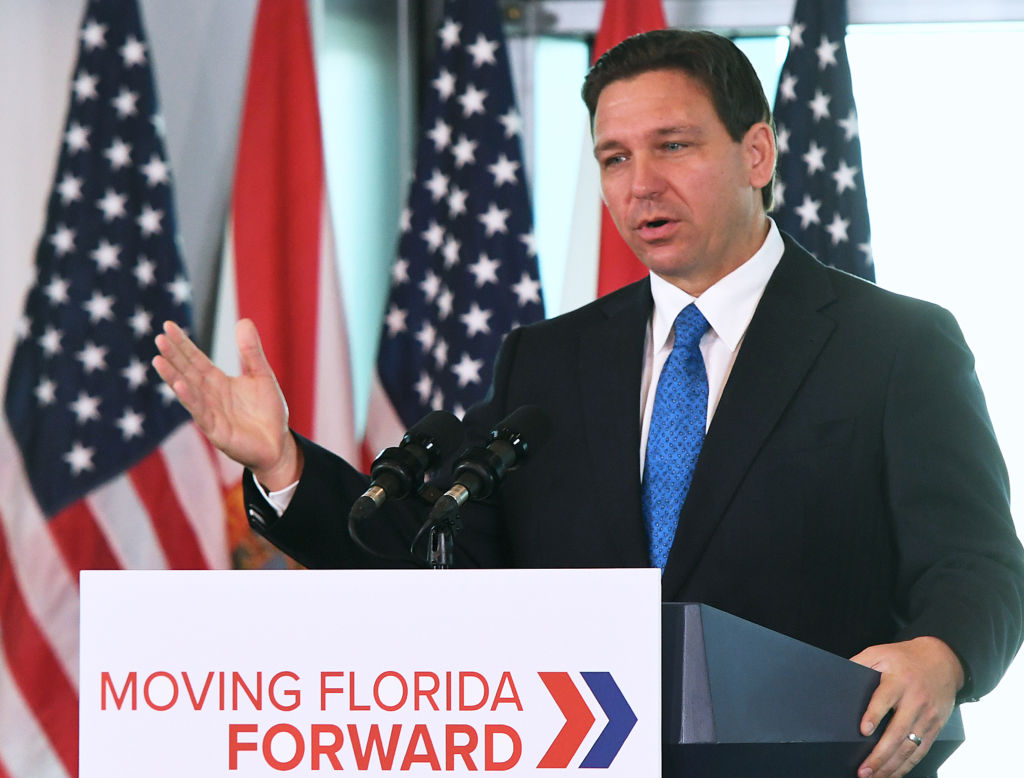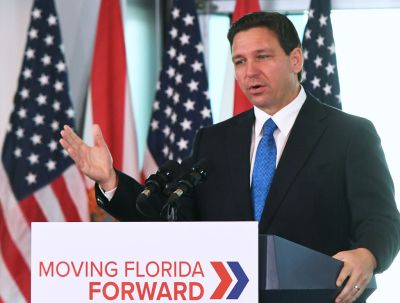Imagine a popular Republican governor from an important state. Despite intense criticism from the national media, he’s notched some huge policy wins that are simultaneously popular with donors, base voters, and conservative intellectuals. His key theme is fighting the Washington establishment and the institutions of progressive power. Then, fresh off of an historic reelection victory, he announces his intent to run for president in a campaign video.
“In the Republican field, there are some who are good fighters. They haven’t won those battles. There are others who have won elections but haven’t consistently taken on the big fights,” the golden boy of the right says, straight to camera. “I’ve done both.”
Sound like a suitable ad for Florida Gov. Ron DeSantis’ eventual presidential campaign debut?
Those were actually words from former Wisconsin Gov. Scott Walker’s 2015 announcement video. It may seem like a lifetime ago, but there was a time when Walker was the “fighter” Republicans craved. He won the governorship three times in four years, thanks to a vicious effort to recall him after he successfully orchestrated a huge victory against public sector unions in his state.
For months, Walker dominated the polls in neighboring Iowa. In late February 2015 he led the rest of the field by more than 2-1. By April, he was leading in New Hampshire, too.
In September, he dropped out of the race.
Most of the autopsies of his campaign focused on a string of gaffes and stumbles in interviews. He refused to say whether he believed President Obama was Christian, he compared unions to ISIS, and seemed open to the idea of a border wall—to protect us from Canada. But he was also the first, but not the last, Republican candidate in the 2016 cycle who couldn’t figure out how to deal with Donald Trump’s insults.
While Walker’s fall was remarkable, it was hardly unique.
Indeed, it seems like every four years somebody looks like the Anointed One for a while, but ends up the answer to a trivia question. I still remember all of the Republicans who told me something like, “You just don’t get it, Sen. Fred Thompson is unstoppable.”
The Walker chapter has many lessons. One is that voters are fickle. What excites them now can quickly bore them. Walker personified the policy and political objectives of the Tea Party era GOP. But he also proved that finding that sweet spot isn’t enough.
For years, my biggest gripe with many charismatic Republican politicians is their often-steadfast refusal to do their homework. Rick Perry was a wildly successful governor of Texas, but when he threw his hat in the presidential arena he couldn’t even memorize the three government agencies he vowed to abolish. Ben Carson didn’t lack for intelligence or work ethic—he was a world-famous pediatric neurosurgeon after all—but he seemed to think that his skills in that field made him an expert on politics and policy. Don’t get me started on Sarah Palin.
Walker had the magic as governor, but he soon discovered that his old tricks didn’t work in a presidential campaign.
Of course, Trump never did his homework and he won anyway. But he also benefited from a huge collective action problem in the overcrowded primaries. The bloc of voters who bought his act was large enough for him to win pluralities in a crowded field. Even so, he never started winning majorities in the primaries until after he’d all but sewed up the nomination.
Today, DeSantis is the closest parallel to Walker. He appears to lead in Iowa and New Hampshire. His fights—over “wokeness” in higher ed, his opposition to COVID lockdowns, etc–are the sweet spot. For now. One more Chinese balloon over America, and nobody will care about gas stoves.
Some Republicans warn that DeSantis could fizzle like Walker because of his marked charisma deficit. He’s awkward and stand-offish. I’ve lost track of the times I’ve been told “he can’t work a room.” In other words, what has worked for him in Florida might not work in living rooms and diners in Iowa and New Hampshire.
On the other hand, DeSantis actually does his homework from the nitty gritty of COVID policy to which cultural fights are likely to garner support—in part because he doesn’t have much charisma to fall back on. Many liberal critics who dismiss his culture war battles make the mistake of thinking he’s dumb because they think the battles are dumb. They’re wrong on both counts.
The 2024 primaries are potentially shaping up for another collective action problem. It will only play out differently if Republicans learn from Walker’s cautionary tale.






Please note that we at The Dispatch hold ourselves, our work, and our commenters to a higher standard than other places on the internet. We welcome comments that foster genuine debate or discussion—including comments critical of us or our work—but responses that include ad hominem attacks on fellow Dispatch members or are intended to stoke fear and anger may be moderated.
With your membership, you only have the ability to comment on The Morning Dispatch articles. Consider upgrading to join the conversation everywhere.